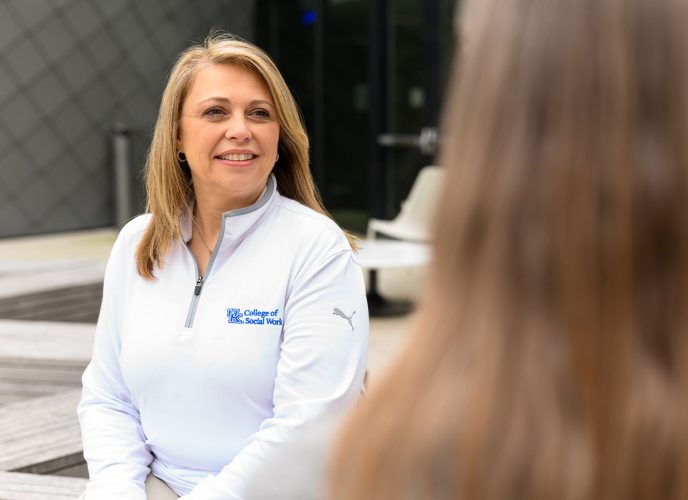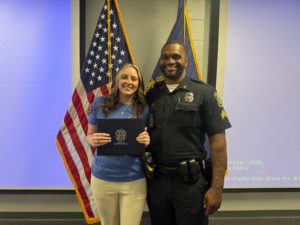One year after launching, the University of Kentucky College of Social Work’s Kentucky Kinship Information, Navigation, and Support (KY-KINS) program has made tremendous strides with initiatives designed to meet the needs of the kinship caregiving community, by helping families access critical resources and connect in peer groups.
Why Kinship is Different
Estella “Nikki” Allen is a foster parent with years of experience and was familiar with the cadence of connecting regularly with social workers, going through training courses and keeping up with documents for the children in her care.
Then, she received a call. “A little girl was born in December of 2020, and she had gone to a friend of the family at first and it just didn’t work out. It wasn’t a good fit. So, they called us,” Allen said.
She was glad to welcome that little girl into her family—but realized that doing so as a kinship caregiver would be a much different experience than fostering. Allen said moving into a kinship role was a bit daunting given the lack of structure and guidance, but participating in the UK College of Social Work KY-KINS peer support program helped her grow into it.
“I’ve been a foster parent, but I’d never been in kinship. Foster parenting and kin are two totally different things.” Allen said. “That is what led me to the program because I was completely lost. I was used to…all the things that we had to do as foster parents and then with kin, it was like I had to relearn my role.”
“The biggest impact was just to not feel alone, or that I was thrown into this role with nothing and had no idea what to do or how to do it…(KY-KINS) was like talking to an old friend,” Allen said.
A New Standard
Stepping into a parenting role can be difficult regardless of the circumstances—from caregiving to budgeting to juggling multiple priorities. For those who do so as friends or family of a child who is suddenly without a parent, acting as “kinship” caregivers creates a unique set of pressures and community resources often fall short of meeting their needs.
The KY-KINS peer support program, which is part of the Kentucky Kinship Resource Center, has taken innovative steps to solve these issues, bridging the gap by connecting new kinship caregivers with mentors who have similar lived experiences and are trained to provide support and resources, ensuring there is someone for families to turn to for guidance and help.
“There is a lot of info out there regarding foster care but very little info regarding kinship care,” Regina Henderson, a KY-KINS program peer support mentor said. “This program offers experienced employees to help get the info and resources to the kinship caregivers that they and the children deserve and are entitled to. I always say that raising a child costs the same whether you are a biological parent, foster parent, or kinship caregiver. Through our program we can help the kinship caregiver get the most out of the resources offered to them.”
Jessica Adkins is also a peer supporter and was thrilled to join a program that was acting to solve the very problems she faced as a kinship caregiver to two girls. “I was a kinship mom!” Adkins said. “I had no one to talk to or anywhere to turn to try and find help and resources…I think that the best part for families is knowing that they are not alone. “
Building the Future of Kinship Support
In the coming year, the UK College of Social Work (CoSW) plans to build on the program’s success and will recruit, hire, and train new kinship caregivers to provide peer support services. Additionally, the college is working with community partners to promote and advertise the program so that all eligible kinship families have the opportunity to participate. As the program continues to grow, UK CoSW will be working with the Department for Community Based Services (DCBS) to identify new methods for supporting kinship families.
This year, KY-KINS expanded from the original 35 counties in the Cumberland and Salt River Trail regions to add 27 counties in the Southern Bluegrass and Two Rivers regions. The program is planned to continue expansion until it is available in all areas of the state.
After just one year, the program’s positive impact is already being felt and leaders are looking forward to more success down the road.
“We work cooperatively with the Department for Community Based Services through the Cabinet for Health and Family Services in an effort to better support the kinship families in the state who are caring for children they did not give birth to but have a loving connection with-whether by family relationship or as a family friend,” Sheila Rentfrow, Kinship Program Coordinator at UK CoSW said.
“Many of these families assume the care, and in many cases, the custody of children during difficult family circumstances, often with little time to prepare educationally or financially. These children come to kinship homes with emotional and behavioral struggles that caregivers must understand and learn to parent through all while caring for the family unit as a whole. It is our intention to continue to provide supportive services that can assist these caregivers in finding resources and programs that can meet their needs and offer stability to the family itself.”






